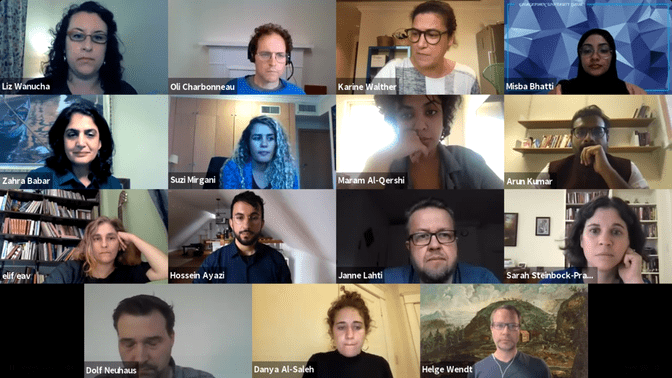American Studies, Regional Studies
The Gospel of Work and Money: Global Histories of Industrial Education Virtual Working Group VI

On September 21, 2021, the Center for International and Regional Studies (CIRS) hosted the final paper workshop under its research initiative, The Gospel of Work and Money: Global Histories of Industrial Education. During the meeting, two draft papers were presented and comprehensively discussed, by the convened scholars.
Dr. Sarah Steinbock-Pratt, initiated the group discussion by presenting her paper titled, “It Is the Work That Counts – Industrial Education in the Philippines.” The paper provided a comprehensive history of industrial education in the Philippines and examined its role and importance as a tool used by the US colonizers to pacify the Filipinos. The author contended that industrial education became a direct way to control the labor and economically develop the Philippines. Though different schooling models were developed for Christians and non-Christians populations, by 1909-1910 industrial education had become central to the education system in the Philippines and remained so even after the Monroe report. The model of industrial education implemented in the Philippines, by the US, had its roots in and was adopted from educations systems developed for Native Americans, African Americans, and the Spanish industrial schools. The author argued that the public-school system in the Philippines was connected to other institutions, such as the penal system that were also attempting to shape and control labor. The Bilibid prison in Manila, which was established by the Spanish and later taken over by the American colonial state, utilized the same rhetoric of uplift, reform, and tutelage as the public schools, to control, discipline, and direct learning and labor, among the Filipinos.
Danya Al-Saleh presented her paper titled, “Technical Petro-Education and the Future of Fossil-Fueled Capitalism in Qatar,” which looked at a specific technical training program offered by the College of North Atlantic- Qatar (CNA-Q), a satellite campus of a Canadian community college in Qatar. The college offers a Technical Certificate Program, which is designed in partnership with Qatar Petroleum (QP) to prepare Qatari students to work as entry-level technicians for the company. The author placed and contextualized this program within the longer history of technical and vocational education in the Qatar’s oil and gas industry. The paper provided that technical and vocational education has historically been a contested space in Qatar, particularly as development in the country depends on immigrant labor. Al-Saleh argues that the underlying contradiction in CNAQ/QP’s program is that it is designed to produce Qatari manual labor for the oil and gas industry in an era when the country’s ruling class are promoting education as a mechanism for producing Qataris who will manage and innovate a future knowledge economy. She examined two ways in which this contradiction in the contemporary moment reveals unresolved conflicts over technical petro-education in Qatar; the complex relationship between national and “foreign” technical labor and the clash of capitalism with the reforms to encourage transferability and upward mobility for the program’s students.
From May to September 2021, CIRS hosted five paper workshops for authors to present their draft chapters and receive commentary from the group. CIRS plans to publish these research papers in an edited collection in the near future.
- For the meeting agenda, click here.
- For the participants’ biographies, click here.
- For the research initiative, click here.
Participants and Discussants:
- Elif Ekin Akşit, Ankara University, Turkey
- Maram Al-Qershi, CIRS – Georgetown University in Qatar
- Danya Al-Saleh, University of Wisconsin–Madison
- Hossein Ayazi, Williams College
- Zahra Babar, CIRS – Georgetown University in Qatar
- Misba Bhatti, CIRS – Georgetown University in Qatar
- Oliver Charbonneau, University of Glasgow
- Mishal Khan, The University of Texas Austin
- Arun Kumar, University of Nottingham
- Janne Laht, University of Helsinki
- Suzi Mirgani, CIRS – Georgetown University in Qatar
- Dolf-Alexander Neuhaus, Free Berlin University
- Sarah Steinbock-Pratt, University of Alabama
- Karine Walther, Georgetown University in Qatar
- Elizabeth Wanucha, CIRS – Georgetown University in Qatar
- Helge Wendt, Max Planck Institute for the History of Science (MPIWG) Berlin
- Clyde Wilcox, Georgetown University in Qatar
Article by Misba Bhatti, Research Analyst at CIRS